Regulation of Health and Social Care Professionals Consultation
Regulation of Health and Social Care Professionals Consultation
Regulation of Health and Social Care Professionals Consultation
Create successful ePaper yourself
Turn your PDF publications into a flip-book with our unique Google optimized e-Paper software.
PUBLIC CONSULTATION<br />
2.37 <strong>Consultation</strong> can be an important procedure through which the regulators are<br />
held to account by the public for the exercise <strong>of</strong> their statutory functions. When<br />
performing specific tasks – such as the issuing <strong>of</strong> guidance, codes <strong>of</strong> conduct,<br />
regulations, rules, competencies <strong>and</strong> st<strong>and</strong>ards – the regulators are normally<br />
required to consult extensively.<br />
2.38 Some <strong>of</strong> the consultation requirements include duties to consult specific groups.<br />
For example, the General Chiropractic Council is required to consult<br />
representatives <strong>of</strong> practising chiropractors before issuing or varying a code <strong>of</strong><br />
practice <strong>and</strong> the General Optical Council when making rules in relation to its<br />
Companies Committee must consult organisations that “represent the interests <strong>of</strong><br />
substantial numbers <strong>of</strong> business registrants”. 22 In places, the legislation also<br />
requires the regulators to consult internally with one <strong>of</strong> its statutory committees;<br />
for example, the General Osteopathic Council must consult its Education<br />
Committee on matters relating to education, training, examinations or tests. 23<br />
2.39 Some <strong>of</strong> the consultation requirements are more general. For example, the<br />
General <strong>Social</strong> <strong>Care</strong> Council is required “to consult any persons it considers<br />
appropriate to consult” before issuing or varying a code <strong>of</strong> practice. 24 Some <strong>of</strong><br />
these general duties to consult include an illustrative list <strong>of</strong> consultees. For<br />
example, the General Pharmaceutical Council is required before undertaking<br />
most <strong>of</strong> its functions to consult such persons it considers appropriate, including:<br />
(1) registrants;<br />
(2) employers <strong>of</strong> registrants;<br />
(3) pr<strong>of</strong>essional bodies or organisations appearing to the Council to<br />
represent registrants;<br />
(4) users <strong>of</strong> the services <strong>of</strong> registrants;<br />
(5) persons or bodies commissioning or funding the services provided by<br />
registrants or at registered pharmacies;<br />
(6) persons carrying on a retail pharmacy business at a registered<br />
pharmacy; <strong>and</strong><br />
(7) persons or bodies providing, assessing, regulating or funding education<br />
<strong>and</strong> training. 25<br />
2.40 Similar illustrative lists are contained in the governing legislation <strong>of</strong> the <strong>Health</strong><br />
Pr<strong>of</strong>essions Council <strong>and</strong> Nursing <strong>and</strong> Midwifery Council, although the<br />
22 Chiropractors Act 1994, s 19(3) <strong>and</strong> Opticians Act 1989, s 3(3).<br />
23 Osteopaths Act 1993, ss 11(3) <strong>and</strong> 14(6).<br />
24 <strong>Care</strong> St<strong>and</strong>ards Act 2000, s 62.<br />
25 Pharmacy Order 2010, SI 2010 No 231, arts 5, 36 <strong>and</strong> 66.<br />
22
















